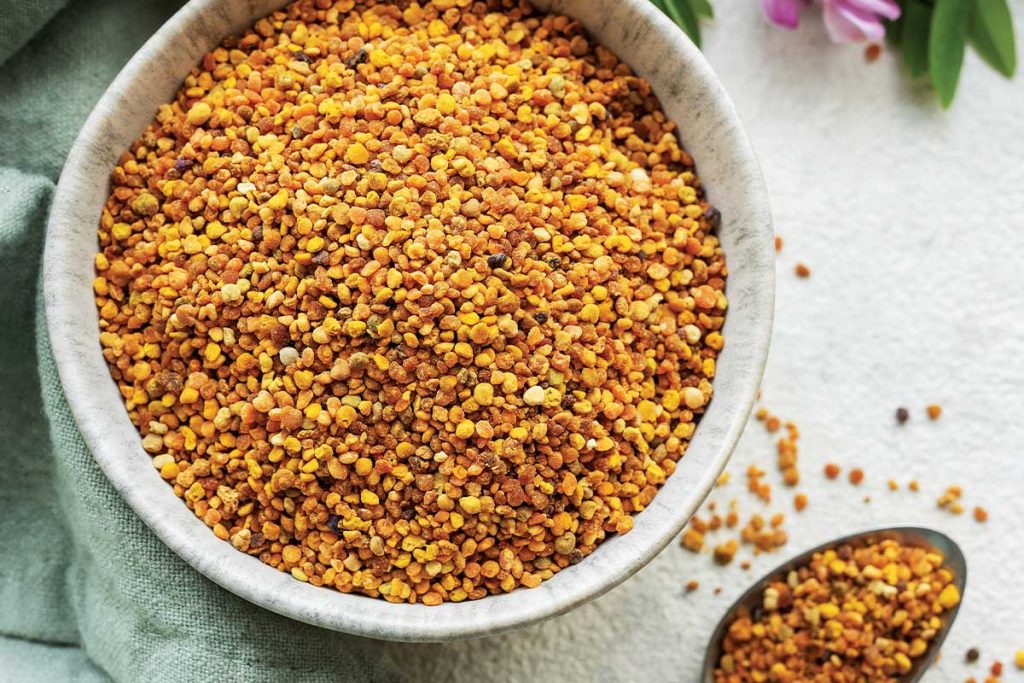
Bees are a busy bunch, and their buzz of activity can also benefit human health. Propolis, bee pollen, and honey are three substances that have been borrowed from bees for thousands of years and used in a variety of ways to boost wellness and provide beauty benefits.
Propolis
From the Greek, meaning to “defend the city,” propolis is known as “bee glue” because the resinous substance, accumulated by bees from various plants, seals holes and cracks in the beehive. It’s also used to smooth out the beehive’s inner surface while retaining its internal temperature and contributing to a germ-free environment.
Bounty of benefits
Sweet- and pleasant-smelling, propolis has antiseptic, anti-inflammatory, antioxidant, antibacterial, antimycotic, antifungal, antiulcer, anticancer, and immunomodulatory properties.. Call it super glue: propolis has been used in treatment of diabetes, burns, wounds, neurodegenerative diseases, gastrointestinal disease, respiratory tract-related diseases, cardiovascular disorders, and beyond.
“Propolis contains polyphenols known as flavonoids, along with vitamins and minerals,” says Karen Wright, ND.
“The constituents vary from geographical area, depending on the surrounding plants the bees forage on, but in general they are well studied and shown to be antimicrobial—for bacteria, viruses, parasites, fungus, and yeasts—anti-inflammatory, and full of antioxidants.
“Propolis is most often used in cosmetic products and for superficial skin and mouth lesions,” Wright adds. “Propolis guards against various types of infections, alleviates painful symptoms, and speeds healing time.”
Tasreen Alibhai, ND, notes that, although further large-scale research on humans is needed, smaller studies and animal studies of propolis point to its promise as an antibacterial and antifungal agent.
Bee pollen
Collecting on the bodies of bees as they flit from one flower to the next, pollen also contains saliva and nectar or honey. Bees carry these balls of pollen back to the hive in sacs on their legs and store them in the honeycomb. The pollen then ferments into “bee bread,” which feeds a bee colony.
Flowering nutrients
Bee pollen contains vitamins, minerals, carbohydrates, lipids, and protein. It also seems to have anti-inflammatory and antioxidant properties while offering immune support and speeding up wound healing.
Immune system benefits
A properly functioning immune system is vital for health and well-being. Scientific research strongly suggests that propolis is one of the most promising immunomodulation agents out there, though more and larger studies are needed.
Propolis seems to increase the production of antibodies; in other words, it is a natural antibiotic that protects the immune system, in part due to its high content of polyphenols, also called phenols.
Propolis can also contribute to a more effective immune system when the immune response isn’t strong enough to control a specific infection.
Bee pollen has been shown to provide enhanced immunity support by increasing the immune system response against infection and disease. Bee pollen extract has also been found to kill potentially harmful bacteria such as E. coli and Salmonella as well as those that cause staph infections.
Prevention of illness
Propolis has antiviral activity. One study found it could potentially interfere with host cell invasion by SARS-CoV-2 and may block a substance called proinflammatory PAK1, a kinase in COVID-19 patients. It might help ward off colds, flu, and other illnesses transmitted by germs.
In your diet
Bee pollen comes in small, crunchy pellets in its natural form. One tablespoon contains 16 calories, 0.24 g of fat, 1.2 g of protein, and 2.18 g of carbohydrates. You can add it to yogurt, oatmeal, smoothies, cereal, salads, drinks, rice bowls, or drinks. It can also be added to raw protein bars, raw desserts, or candies.
Propolis comes in chewable, tablet, capsule, or liquid extract form. Due to its antimicrobial, antiviral, and antioxidant properties, it’s available in the form of mouthwash solutions, creams, throat lozenges, powder, and also in many cosmetic and dermatological products.
Oh honey!
Let’s not forget about honey. Along with its known healthful properties like healing wounds and soothing coughs, honey is also considered the oldest skincare ingredient still in use today.
Honey functions as a skin softener and soother, moisture retainer, hair conditioner, and pH regulator in a wide range of beauty products. Honey also helps maintain youthful-looking skin and prevents wrinkles, and can also help prevent infection.
DIY honey face rinse
Try this homemade concoction: fill a bottle two-thirds with honey, one-sixth with natural soap and the remainder with an organic healing oil—for example, evening primrose. Start by washing your face with water. Then, massage a quarter-sized amount of the mixture into your face and rinse.
This article was originally published in the September 2024 issue of delicious living magazine.